Before whiskey there was… Poitín [Part 1]
Poitín is one of the longest established spirits in the world with the first record of it in the 6th century and has a rich and turbulent history.
Before a handful of craft distillers turned it into a premium product to add to their award-winning portfolios and barmen challenged themselves to create the most prestigious Poitín cocktails ; it was classified as illegal in Ireland for centuries.
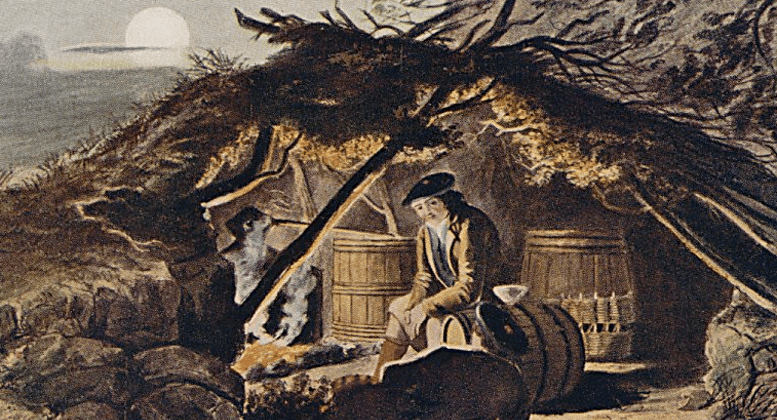
So, what is Poitín and how the hell is it made?
Poitín or ‘Poteen’ is a raw spirit or ‘moonshine’ that was traditionally distilled from locally produced cereals (grain), sometimes barley and later from potatoes, which was introduced into Europe in the 16th century. The other two keys ingredients were yeast and sugar. The term Poitín is a derivative of the Irish word pota, meaning “pot” and basically describes the little copper pot stills, in which people used to make it at home.
This clear Irish spirit is famous for its alcohol strength. It can be made anywhere from 40% to up to 90% of alcohol by volume. It is meant to have a pleasing herbal aroma. Contrary to whiskey, with its three years minimum of maturation (and one day) in a cask, Irish poteen can’t be aged (or at least no more than 10 weeks according to the new regulation). It’s rather stored or held than matured.
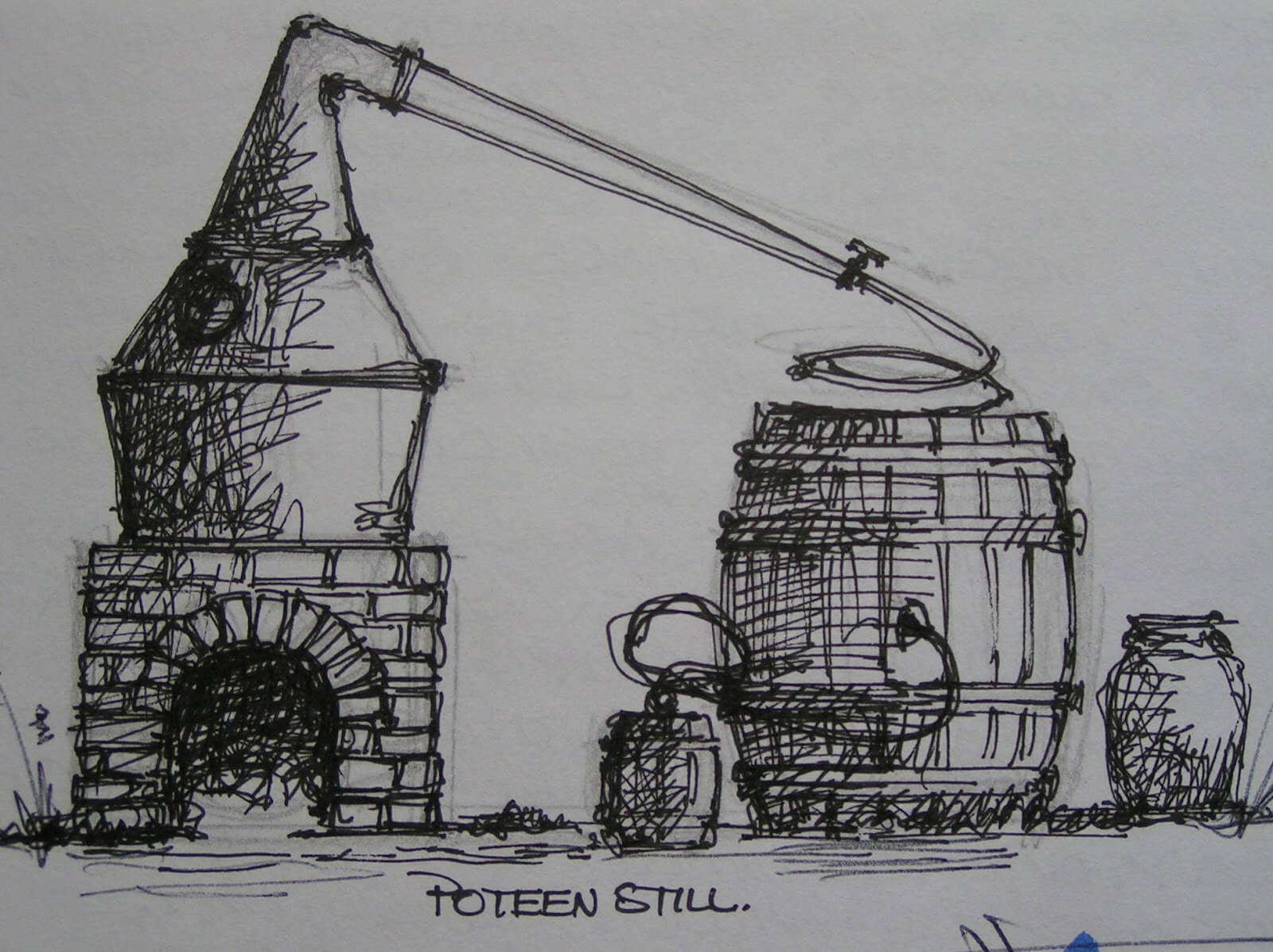
The mash produced at the brewing stage can be fermented as a clear liquid or as a ‘solids-in’ fermentation. For a clear liquid (wort) the mash will be filtered in a lauter tun or mash filter to remove the solids. For a ‘solids-in’ fermentation this solids separation step is omitted. At the start of fermentation yeast is added and during the course of the fermentation the yeast will convert the fermentable sugars into alcohol and other flavour congeners. The resultant liquid is known as ‘wash’.
The base ingredients are fermented, usually in wooden barrels for three weeks to produce a low wines spirit. To obtain the final highly alcoholic beverage, the copper still is filled with low spirit (a beer, wine or boiled potatoes yeast mash), is placed over an open fire, fuelled by turf (peat). The evaporated spirit vapour rises into the alembic hood to cool down and is drawn up into the neck (sometimes known as a Swans Neck) where it condenses back into a liquid and flows down a cooling pipe and through a barrel filled with cold water.The stronger spirit can be returned to the still for a second distillation (and a stronger brew) if needed.
Poitín history: from being a dying craft to hitting the top shelves!
Poitín was created by an Irish monk in 584 AD and its production started in monasteries before the skills and methods were transferred into the wider population.
In 1661, the Brittish government changed the licencing laws. Taxation on alcohol was introduced by the Crown saying that distillers must pay a tax on the quantity of spirit produced for private use. The Irish are well- known for their spirit of independence and their fights against the taxes (aka water charges ;). They also have a history of ingenious tricks to avoid paying them, or at least not fully. One of the best examples is the creation of unique style of pot still whiskeys made from barley and malted barley to lower the cost of taxed malted barley on their whiskey production. Unsurprisingly, the distillers refused to cooperate. Their wise way to avoid taxation was to hide their spirit in concealed cellars. The London Parliament decided to introduce a tighter legislation with a tax on pot still capacity, which would guaranteed their levy, no matter the quantity of spirit produced (or hidden). And what did the Irish do? They started to distil in small capacity stills to pay cheaper taxes. In 1760, a further law made it illegal to operate a still without a licence. The idea was to force Irishmen to buy their liquors from large corporate distilling companies, easier to tax than the small domestic-scale stills. Although, the laws encouraged big distillers to accentuate the production's speed and volume, which lead to Poitín's quality drop. The illicit small-batch Poitín was made even more desirable for the Irish.
Irish Poitín was outlawed by King Charles for its so-called potency, but most likely because of the difficulty of taxing the homemade elixir and as part of a wider effort to repress the Irish Culture. This ban lasted for more than 300 years but the illegal status of the drink didn’t hinder its underground production and consumption. In fact, Ireland had by far the highest number of illegal alcoholic establishments called the speakeasies, where huge amount of homemade Poitin was consumed.
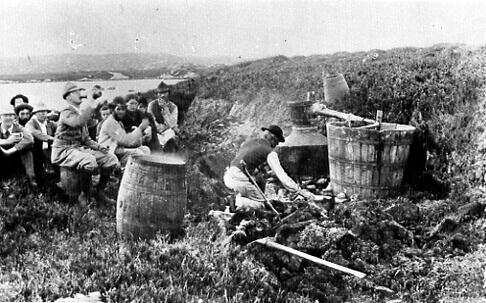
The ‘Mountain Dew’ or ‘Mountain Tea’ was commonly produced with a small, portable vat (the famous Poitín) in remote rural areas in secret woodlands, lonely bogs or Connemara, Cavan and Wicklow hills moonlight. The fires only burned on windy days to avoid attracting the authorities’ attention from the lingering smoke. Bad weather was actually a blessing for illicit distillers. The washes themselves were often operated on the edges of land boundaries so that it would be possible to deny ownership if caught.
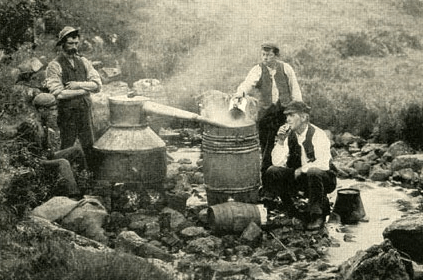
We had to wait until the 7th March 1997 for the spirit to become legal for consumption again. The Irish Republic loosened legislation, provided its alcohol content was reduced, and made it possible for several Irish companies to produce, sell and export poitín. The first step made toward legal Poitín's production -properly licenced, of course - was made when, in 1987 Olivier Dillion, from Bunratty Winery was allowed to produce poitín to the condition that it would be for export only. That's only ten years later that Irish Revenues Commissioners allowed Poitín's sales on the Irish soil.
Poitín in the Irish Folklore
Recipes were handed down through generations and Poitín became a symbol of Irish pride and independence. The idea of the poitín outlaw took root in Irish culture as an emblem of the rebel spirit. In The Pogues' song Fairy Tale of New York, "The Rare Ould Mountain Dew" refers to the national grog.
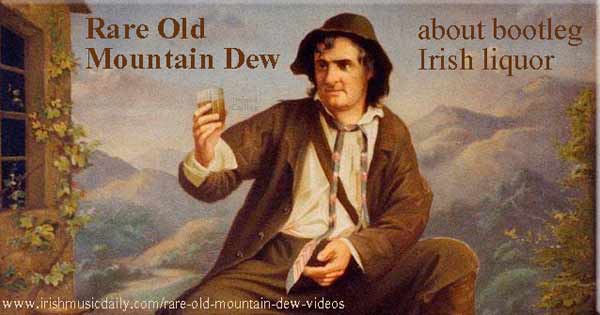
"There's a neat little still at the foot of the hill
Where the smoke curls up to the sky,
By a whiff of the smell you can plainly tell
That there's poteen boys close by.
For it fills the air with a perfume rare
And betwixt both me and you
As home we roll, we can drink a bowl
Or a bucketful of mountain dew."
There are many myths and legends about Poitín. Every family has a story about it. Here are a few amusing and interesting ones.
Somehow, St. Patrick brewed up the first batch of Poitín after running out of wine while saying Mass.
In fairness, it can make you smile but did Jesus turn water into wine or was it an early form of distillation? Who knows, he might have been a distillation’s pioneer, like the alchemists and physicians, working on creating medicines, perfumes and balms that discovered distillation and later on the ‘aqua vitae’ (today’s ‘uisce na beatha’, water of life or whiskey).
Coming back to St. Patrick, he was born in Wales and went to Europe to train to become a monk. Welsh Penderyn distiller David Cover explained in an interview that “French monks had deciphered the method of distilling from Arab perfume-making texts, and had started to distil wine to make brandy. Of course, grapes don’t grow so well in [Ireland] so when Patrick came back with the method, people used different grains—like malted barley—and made whiskey. The story is that he then went to evangelise Ireland and introduced the spirit there.”
For which the Irish also sainted him, perhaps!
Whiskey was created from Poitín.
Some believe that whiskey was born from discovering hidden and lost (from lack of memory the morning after a session) buried Poitín barrels, which years of maturation in the cask had turned into coloured whiskey.
If you drink Poitín, you can go blind.
With a whooping percentage of alcohol, Poitín can possibly be illness-inducing since it is not always of a standard quality. Its quality depends on how it has been made, mainly equipment quality and distillers’ skills but also the ingredients used. Reputations were built on the quality of the distiller's poitín, and many families became known for their distilling expertise, where a bad batch could put a distiller out of business overnight. In Achill island, Inishkea distillers were actually considered ‘Saints’ because they were producing the most flavoursome Irish Poitin. Traditionally, the flavours were rather harsh and unpleasant. The taste could be rough and abrasive. It has been claimed that the drink can cause blindness but this is possibly due to adulteration rather than lack of quality. It is most likely to make you really drunk and some say the drunkenness can last for days.
The Irish wake was created because of the after effects of Poitín.
In Ireland, a wake is held for the dead, as there were doubts that the person was really dead and was just unconscious from drinking. Catatonic state brought on by lead poising, caused from drinking from pewter tankards, could also be mistaken for death. The burial delay was justified by the fact the dead could wake up at night and start knocking inside the coffin (an inside knock was built inside the coffin) and yell to get out. The poor unfortunate had then a chance to rejoin the others and drink more Poitín!
It has magical healing effects.
Among many beliefs that Poitin had magical effects, is that it can cure arthritis. Farmers often used it (and still do) as a cure for sick calves and other farm animals who are suffering from cramp or other muscle problems. Poitín is also used in the Irish midlands as an alternative to deep heat. It is commonly rubbed onto muscles to warm them.
Today’s Poitín
Since 2008, Poitín has a protected status, with a Georgaphical Status backed by law, that only a small number of Irish food and drink products have been granted. Like Champagne, which has to come from the Champagne Region in France to be considered Champagne and Parmesan cheese has to come from Parmigiano in Italy ; Poitín can only be made in Ireland. Same as Scotch, which can only be matured in Scotland to be called Scotch.
New craft distillers are carrying on the tradition and legal Poitín has made its come back on the shelves in the last few years. It can be bought in pubs, off-licences and even supermarkets! Although, today’s Poitín is much smoother and more palatable to drink. Poitín is enjoyed straight up like the old days or most recently, used as a base instead of gin, tequila, vodka or whiskey for creative and prestigious cocktails in Dublin and abroad. Poitín, is actually giving more punch to cocktails than your usual spirit. In the UK, it has become so trendy that London cocktail bar Shebeen is selling eight different types of poitín. Last Paddy's Day, the Reverend JW Simpson retro-cocktails bar off Tottenham Court Road was hosting an Irish poitín masterclass, in which moonshine expert Charlie McCarthy explained how it can be "incorporated into a range of delicious cocktails" and asked guests to try out their own creations. We’re pretty far off its old reputation.
New revived Poitín’s recipes vary greatly, and some purists would disagree to call the new craft ‘Poitín’ for the recipe diverges from the old times! Some new crafts like Knockeen Hills Poteen, offer a formula as stiff as the one King Charles decided to outlaw and the Celtic Spirit Company of Anglesey is from Wales but makes its Celtic Poteen from an old family recipe dating from the end of the 19th century (a combination of spirit distilled from vegetables and grains). But Glendalough, Bunratty Mead, and Coomara Irish Spirit, offer a less potent and more drinkable version, flavoured with wild berries and orchard fruits. Blackwater Distillery released its ‘The Spirit of West Waterford’ and Teeling Distillery also released its version of the ‘Spirit of Dublin’ Revival, made from corn, which could be considered closer to an unaged whiskey.
Illegal poitín still remains but its production's scale is difficult to estimate. It shouldn’t be too difficult to find someone who produces some home distilled Irish Poitín the way it used to be, if it’s not the Premium stuff you are after. One night, I myself had a seriously tasty vanilla flavoured dram from a family bottle that I wouldn’t have minded to sip more of. You can also venture online to find a homemade ‘Ould Mountain Dew’ recipe to try yourself. Athough, the family recipes are usually kept with the same secrecy that in the 6th century, so ádh mór!
In any case, if it is either to follow the past of your ancestors (or uncles), discover its punch in a cocktail or enjoy it raw as an after meal digestive, there are lots of reasons to enjoy Poitín!
See Poitín [Part 2] Five New Generation of Poitíns we recommend
Sláinte!
Charlotte Haffner






Leave a Comment